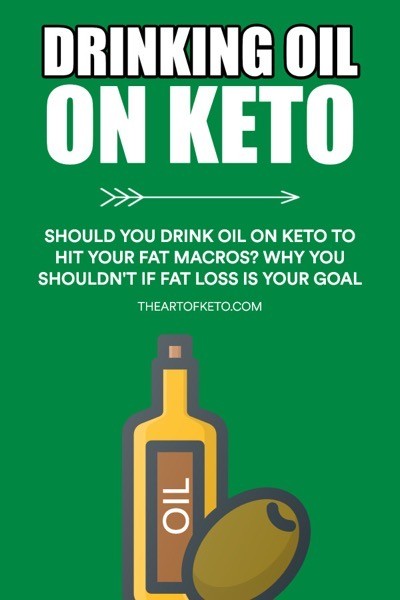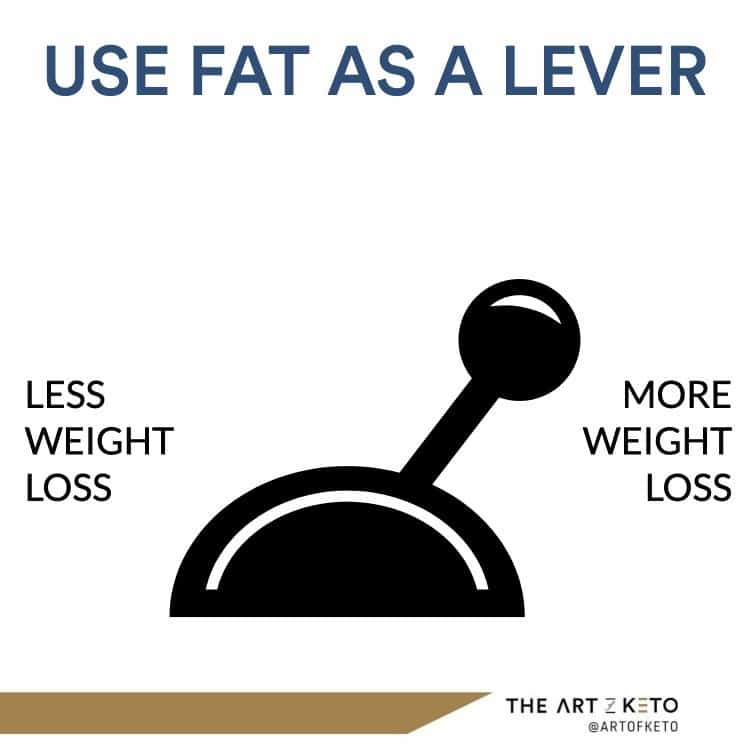Keto Diet Drink Olive Oil
When I first started my ketogenic diet, I stuck to my macros and percentages to the gram, even if that meant adding in a little bit of oil or butter to hit them.
Naturally, I wondered if this was a smart move because it wasn't as if I was hungry and wanted to drink or drench my food in oil.
Should you drink oil on keto? When fat loss is your goal, it's ok to eat under your fat macros every once in a while, you'll even speed up fat loss by doing so. Maintaining a metabolic state of ketosis isn't predicated by how much fat you eat, but by how much you restrict your carbohydrates to.
In this article, I'll go over why you should or shouldn't drink oil on keto, which oils you may want to include if doing so, what happens if you don't eat enough fat on keto, and how to speed up your ketosis.

Drinking Oil On Keto, Yay, Or Nay?
I had the same question as you once upon a time. I wondered how I would increase my fat intake to hit my numbers and make sure I had enough fat each day.
Once I dove deep into the research about ketogenic diets, fat loss, performance, and everything in between, I realized it might not be necessary for most individuals.
There is a time and a place where you may need to drink a bit of oil to get in enough calories, but this doesn't apply for 99 percent of the people reading this article.
Unless you are an athlete, such as an ultra-endurance runner, drinking oil on keto may be unnecessary and can slow your progress.
If fat loss is your goal, you may want to skip on drinking olive oil and most other oils.
I'll explain why in just a sec, but make sure you keep an open mind to what you're about to hear as it may go against what your friend or other said guru told you.
How To Increase Fat Intake On Keto
You may be wondering if you should drink olive oil or any other oils on keto to increase your fat intake on keto.
But first, ask yourself WHY you need to increase your fat intake.
Is it because you were told you need to hit a certain number or percentage of fats every day?
The truth is, the ONLY requirement to achieve and maintain a state of ketosis is carbohydrate restriction, and NOT a high fat intake.
Meaning, you could get into ketosis and stay there even if you ate almost no fat at all.
The more fat you eat in your diet, the less fat from your body is used for energy.
I'm not suggesting that you eat no fat at all, but if you're short on your macros some days, I'm merely stating there's no need to seek ways to increase your fat intake.
What Happens If You Don't Eat Enough Fat On Keto?
A ketogenic diet is labeled a "high fat" diet only as a "side effect" of restricting carbohydrates.
What's that mean, you ask?
There are three primary macronutrients that you consume each day (protein, carbs, and fat). Carbohydrates and fats are what your body uses for energy during high and low-intensity activities.
Since protein is a relatively fixed number, when you eliminate carbohydrates, something has to make up the difference in calories.
Yepp, FAT!
Therefore, the fat intake will act almost like a lever that we can pull up or down based on our goals (fat loss or muscle gain) while following a ketogenic diet.

Don't get me wrong; fat is important in the diet. Fats provide the body with energy, help with the absorption of fat-soluble vitamins, and act as structural elements of cell walls. 1https://www.ncbi.nlm.nih.gov/pubmed/21229418
Fats in the diet also helps to delay gastric emptying and reduce the insulin response of carbohydrates in the diet, which leads to fewer insulin spikes, decreased hunger and increased satiety. 2https://www.ncbi.nlm.nih.gov/pubmed/16537685
Outside of the essential fats which you're likely getting from the seafood, meat, and dairy you're enjoying while on a ketogenic diet, there's almost no drawback to eating less fat.
Unless you consider faster weight loss a drawback… because that's what happens when you don't eat enough fat on keto.
How You Can Speed Up Ketosis
The only reason you may not want to go too low in fats is due to the importance fat plays on your health and digestion, but that number is probably a lot less than what you're already consuming.
Now, when I refer to how you can speed up ketosis, what I mean is how you can speed up weight loss.
After all, that's your primary goal.
As I stated previously, protein is a relatively constant number, and with carbohydrates already restricted, fat will act as a lever that we pull up or down depending on your goal (weight loss vs. weight gain).
First and foremost, when it comes to weight loss, calories STILL matter.
Therefore, one of the easiest ways to speed up weight loss is by decreasing your fat intake. The calories per gram of each macronutrient and TEF is as follows:
- Fat = 9 calories per gram, and has a TEF of 0-3%
- Carbohydrates = 4 calories per gram, and has a TEF of 5-10%
- Protein = 4 calories per gram, and has a TEF of 20-30%
Fat is more than double the number of calories per gram compared to protein or carbohydrates, and it's the least thermogenic as well. 3https://www.ncbi.nlm.nih.gov/pubmed/31021710 4https://www.ncbi.nlm.nih.gov/pmc/articles/PMC524030/
The thermic effect of food
It takes a certain amount of energy (calories) to digest, absorb, and metabolize your food. Each macronutrient varies in the energy required for digestion. This process is known as the thermic effect of food (TEF) or diet-induced thermogenesis (DIT). 5https://www.ncbi.nlm.nih.gov/pubmed/4025189 6https://www.ncbi.nlm.nih.gov/pubmed/6357848
After digestion, for the same 100 calories, you'll be left with the following:
- Fat = 97 – 100 calories
- Carbohydrates = 90 – 95 calories
- Protein = 70 – 80 calories
Simple manipulations in your macronutrients will net you fewer calories. Fat has the lowest TEF and the most amount of calories per gram compared to the other macronutrients.
How I Would Set Up Macros For Maximum Fat Loss
So we've established drinking oil on keto may not be necessary, but what should you do?
First, here's how I would set up your calories and macros.
Without knowing you personally or your metabolism, when it comes to weight loss, I find most people fall in the range of between 10 – 12 calories per pound to achieve a reasonable amount of weight loss ~1-2 lbs/week.
For a starting point of how many calories to eat, you would take your bodyweight and multiply it by 10 – 12. For a 150 pound individual, this would mean they would consume 1500 – 1800 calories per day if their goal were weight loss.
Next, I would set protein intake at 1 gram per pound of lean body mass (total body weight – fat weight). To make it easier, you would consume 1 gram per pound of DESIRED bodyweight.
Meaning, if you were 150 pounds by wanted to get down to 130, then you would eat AT MINIMUM 130 grams of protein per day.
Since carbohydrates are restricted, that's an easy number to calculate. Most individuals fall between 20 and 50 grams of net carbs per day, so let's say 30 grams to make it easy.
The remaining calories could then be filled with fat and tapered up or down depending on progress.
Sample based on the above based
A 150-pound individual who's desired end body weight is 130 pounds.
- Calories: 150 x 12 = 1800 calories
- Protein: 130 grams = 130 x 4 calories = 520 calories
- Carbohydrates: 30 grams = 30 x 4 calories = 120 calories
- Fat: Total calories – protein calories – carbohydrates calories
- 1800 – 520 – 120 = 1160 calories / 9 calories per gram = 129 grams of fat
Our example would eat 1800 calories with 130 grams of protein, 30 grams of carbs, and 129 grams of fat.
If I was setting this up for a client and they preferred less fat and more protein, they could increase their protein intake by ~2 grams for every 1 gram of fat less they eat per day.
In addition, if they wanted to keep protein intake the same but were going to fall short of fat intake for the day, that would be perfectly fine.
I wouldn't have them chug oil or add extra fats to their meals to "hit their macros." Falling short on their fat once in a while is not going to be detrimental to their diet; if anything, it will accelerate it.
What Oil To "Drink" On Keto If Any
If you're a stickler for hitting your exact numbers despite what I've said, if I were to recommend any oil to hit your fat intake, it would be MCT Oil.
Studies show that MCT's are more satiating than other fats. 7https://www.ncbi.nlm.nih.gov/books/NBK53550/ In this study, a breakfast high in MCT's resulted in lower energy intake at lunch almost 4 hours later. 8https://www.ncbi.nlm.nih.gov/pubmed/12634436 And another study showed people naturally ate less at dinner after a high MCT lunch was consumed. 9https://www.ncbi.nlm.nih.gov/pubmed/11684530
Also, MCT oil, in combination with a very low-calorie diet, resulted in more satiety and a higher rate of weight loss in these studies. 10https://www.ncbi.nlm.nih.gov/pubmed/11571605 11https://www.ncbi.nlm.nih.gov/pubmed/18326600
The other added benefit of MCT oil is due to their shorter chain length; they travel straight from the gut to the liver and can be converted to ketones for use as an immediate source of energy. 12https://www.ncbi.nlm.nih.gov/pubmed/18296368 13https://www.ncbi.nlm.nih.gov/pubmed/27080715
Besides, since MCT oil is processed differently, it may have a higher thermic effect compared to other fats, which only yield a 0-3% increase in metabolism, leading to more calories burned. 14https://www.ncbi.nlm.nih.gov/pubmed/7072620
Now, fair warning, if you haven't had MCT oil, you may want to start slowly and increase the amount as your body becomes accustomed to it.
Too much MCT oil too soon may lead to upset stomach and frequent trips to the bathroom for specific individuals.
MCT Oil I recommend:
- Viva Naturals Organic MCT Oil
- If you prefer a powder for easy travel, try MCT Oil powder from Perfect Keto and use code AOK for 15% off by clicking the banner below
If you want to take it up a notch, and can spare a few more dollars, I would recommend C8 Oil. MCT oil is further extracted to leave the C8 fatty acid (caprylic acid), which is even more easily converted into ketones than MCT oil alone.
C8 Oil I would recommend:
- Bulletproof Brain Octane Oil
The Takeaway
There's a good chance that you're getting more than sufficient amounts of fat while following a ketogenic diet without drinking oil.
If you find yourself falling short on your fat intake now and then, you can rest knowing there are no adverse effects to eating less fat unless you consider faster weight loss negative.
However, if you are a stickler for hitting your numbers accurately, I would recommend using MCT oil over something like olive oil or butter due to its effect on satiety, metabolism, and increased ketone production.
Just make sure you start small with one teaspoon at a time, then gradually work your way up to prevent gastric upset.
Related
Source: https://www.theartofketo.com/drinking-oil-on-keto/